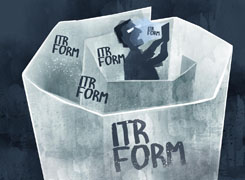Mihir Tanna |1077 Answers |Ask -Follow
Tax Expert - Answered on Oct 20, 2022
He handles various kinds of matters related to direct tax such as PAN/ TAN application; compliance including ITR, TDS return filing; issuance/ filing of statutory forms like Form 15CB, Form 61A, etc; application u/s 10(46); application for condonation of delay; application for lower/ nil TDS certificate; transfer pricing and study report; advisory/ opinion on direct tax matters; handling various income-tax notices; compounding application on show cause for TDS default; verification of books for TDS/ TCS/ equalisation levy compliance; application for pending income-tax demand and refund; charitable trust taxation and compliance; income-tax scrutiny and CIT(A) for all types of taxpayers including individuals, firms, LLPs, corporates, trusts, non-resident individuals and companies.
He regularly represents clients before the income tax authorities including the commissioner of income tax (appeal).... more

My wife has filed IT returns in time based on the Form 16 received from employer. It was noticed that the tax received as per 26AS was less than shown in Form16.
Now employee has informed that it was a mistake in Form 16 and may issue revised Form 16.
Now if revised ITR is filed does she need to pay Rs 5,000 to IT for no mistake of hers?
You may like to see similar questions and answers below
Mihir Tanna |1077 Answers |Ask -Follow
Tax Expert - Answered on Nov 02, 2022
Mihir Tanna |1077 Answers |Ask -Follow
Tax Expert - Answered on Aug 17, 2023
Mihir Tanna |1077 Answers |Ask -Follow
Tax Expert - Answered on May 05, 2025
Vipul Bhavsar |117 Answers |Ask -Follow
Tax Expert - Answered on Sep 18, 2025
Vipul Bhavsar |117 Answers |Ask -Follow
Tax Expert - Answered on Sep 18, 2025
Vipul Bhavsar |117 Answers |Ask -Follow
Tax Expert - Answered on Sep 18, 2025
Naveenn Kummar |203 Answers |Ask -Follow
Financial Planner, MF, Insurance Expert - Answered on Sep 18, 2025
Naveenn Kummar |203 Answers |Ask -Follow
Financial Planner, MF, Insurance Expert - Answered on Sep 18, 2025
Naveenn Kummar |203 Answers |Ask -Follow
Financial Planner, MF, Insurance Expert - Answered on Sep 18, 2025
Naveenn Kummar |203 Answers |Ask -Follow
Financial Planner, MF, Insurance Expert - Answered on Sep 18, 2025
Naveenn Kummar |203 Answers |Ask -Follow
Financial Planner, MF, Insurance Expert - Answered on Sep 18, 2025
Naveenn Kummar |203 Answers |Ask -Follow
Financial Planner, MF, Insurance Expert - Answered on Sep 18, 2025
Naveenn Kummar |203 Answers |Ask -Follow
Financial Planner, MF, Insurance Expert - Answered on Sep 18, 2025























